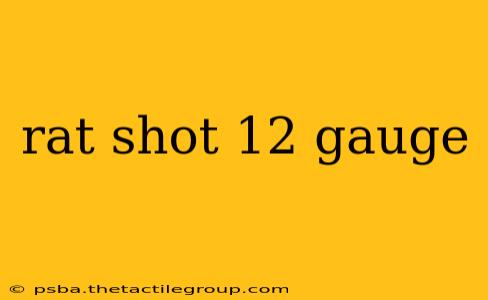Dealing with a rodent infestation can be frustrating, and finding the right solution is crucial. While various methods exist, 12-gauge rat shot offers a powerful and often effective approach. This comprehensive guide explores everything you need to know about rat shot, its uses, safety precautions, and ethical considerations.
What is 12-Gauge Rat Shot?
12-gauge rat shot is a type of ammunition specifically designed for close-range pest control. Unlike traditional shotgun shells containing large pellets for hunting, rat shot uses numerous smaller projectiles, often made of lead or other materials like steel or bismuth. These tiny projectiles are effective at dispatching rodents at short ranges, minimizing the risk of over-penetration and damage to surrounding property.
Types of Rat Shot:
Several types of 12-gauge rat shot are available, each with slightly different characteristics:
- Lead shot: Historically the most common type, lead shot offers good stopping power but raises environmental concerns due to lead toxicity.
- Steel shot: A more environmentally friendly alternative, steel shot is harder than lead and may cause increased barrel wear.
- Bismuth shot: A non-toxic and dense option, bismuth shot provides excellent performance but is generally more expensive.
Choosing the right type depends on your priorities—balancing effectiveness, cost, and environmental impact.
Using 12-Gauge Rat Shot Responsibly:
Before using rat shot, it's vital to understand the associated safety and legal implications.
Safety Precautions:
- Always wear appropriate eye and ear protection: The discharge of any firearm, even a shotgun, can cause significant injury if safety measures are not observed.
- Maintain a safe backstop: Ensure your target area is safe and that there’s a solid backstop to prevent projectiles from ricocheting or penetrating beyond the intended target area.
- Be aware of your surroundings: Never point a firearm at anything you don't intend to shoot. Always be mindful of potential hazards and bystanders.
- Proper firearm handling: Follow all firearm safety rules, including proper storage and handling techniques. If you are unfamiliar with firearm safety, seek professional training.
- Legal restrictions: Check your local and state laws regarding the use of firearms and ammunition. Restrictions on ammunition type and usage vary significantly based on location.
Ethical Considerations:
While effective, rat shot should be used responsibly and ethically. Consider humane alternatives like trapping before resorting to lethal methods. Always prioritize minimizing harm to non-target animals or property.
Alternatives to Rat Shot:
Depending on your circumstances, other methods might be more suitable or preferable. These include:
- Trapping: Trapping offers a humane way to capture and relocate rodents.
- Rodenticide: While effective, rodenticides pose risks to pets and wildlife, so use them cautiously.
- Professional pest control: Hiring a professional pest control service can provide an effective and safe solution, especially for severe infestations.
Conclusion:
12-gauge rat shot can be an effective method for rodent control when used responsibly and ethically. Always prioritize safety, consider alternative methods, and check local laws and regulations before employing this approach. Remember that proper training and a thorough understanding of firearm safety are crucial for responsible firearm use.

